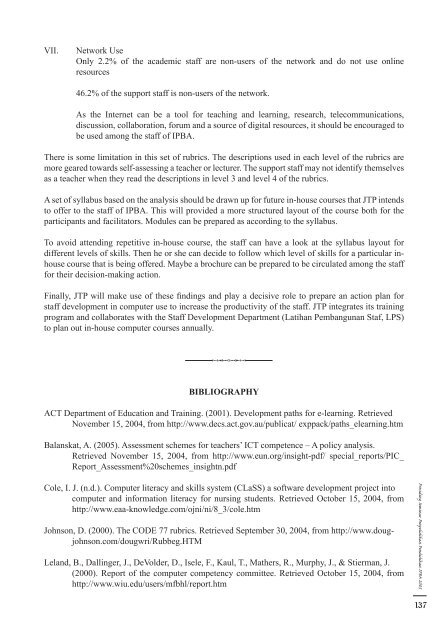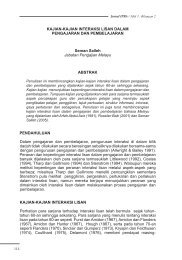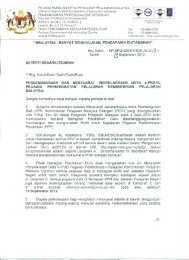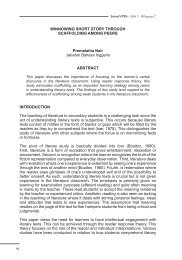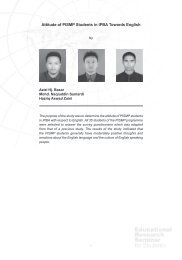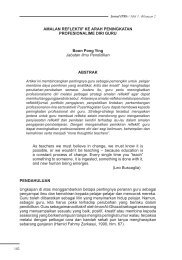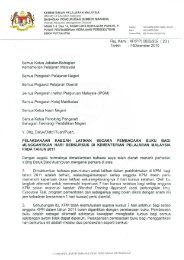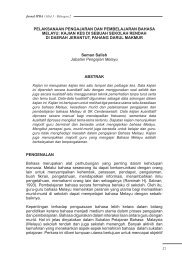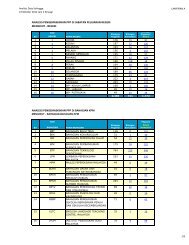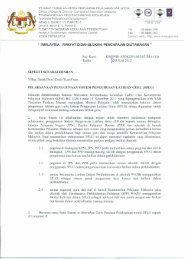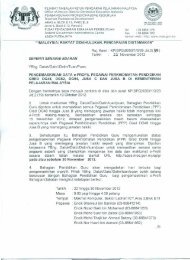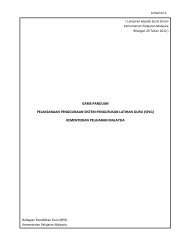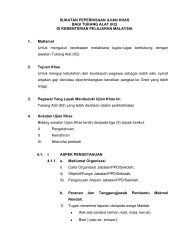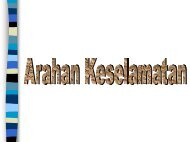Prosiding Seminar Penyelidikan Pendidikan 2005 - Kementerian ...
Prosiding Seminar Penyelidikan Pendidikan 2005 - Kementerian ...
Prosiding Seminar Penyelidikan Pendidikan 2005 - Kementerian ...
You also want an ePaper? Increase the reach of your titles
YUMPU automatically turns print PDFs into web optimized ePapers that Google loves.
VII.<br />
Network Use<br />
Only 2.2% of the academic staff are non-users of the network and do not use online<br />
resources<br />
46.2% of the support staff is non-users of the network.<br />
As the Internet can be a tool for teaching and learning, research, telecommunications,<br />
discussion, collaboration, forum and a source of digital resources, it should be encouraged to<br />
be used among the staff of IPBA.<br />
There is some limitation in this set of rubrics. The descriptions used in each level of the rubrics are<br />
more geared towards self-assessing a teacher or lecturer. The support staff may not identify themselves<br />
as a teacher when they read the descriptions in level 3 and level 4 of the rubrics.<br />
A set of syllabus based on the analysis should be drawn up for future in-house courses that JTP intends<br />
to offer to the staff of IPBA. This will provided a more structured layout of the course both for the<br />
participants and facilitators. Modules can be prepared as according to the syllabus.<br />
To avoid attending repetitive in-house course, the staff can have a look at the syllabus layout for<br />
different levels of skills. Then he or she can decide to follow which level of skills for a particular inhouse<br />
course that is being offered. Maybe a brochure can be prepared to be circulated among the staff<br />
for their decision-making action.<br />
Finally, JTP will make use of these findings and play a decisive role to prepare an action plan for<br />
staff development in computer use to increase the productivity of the staff. JTP integrates its training<br />
program and collaborates with the Staff Development Department (Latihan Pembangunan Staf, LPS)<br />
to plan out in-house computer courses annually.<br />
BIBLIOGRAPHY<br />
ACT Department of Education and Training. (2001). Development paths for e-learning. Retrieved<br />
November 15, 2004, from http://www.decs.act.gov.au/publicat/ exppack/paths_elearning.htm<br />
Balanskat, A. (<strong>2005</strong>). Assessment schemes for teachers’ ICT competence – A policy analysis.<br />
Retrieved November 15, 2004, from http://www.eun.org/insight-pdf/ special_reports/PIC_<br />
Report_Assessment%20schemes_insightn.pdf<br />
Cole, I. J. (n.d.). Computer literacy and skills system (CLaSS) a software development project into<br />
computer and information literacy for nursing students. Retrieved October 15, 2004, from<br />
http://www.eaa-knowledge.com/ojni/ni/8_3/cole.htm<br />
Johnson, D. (2000). The CODE 77 rubrics. Retrieved September 30, 2004, from http://www.dougjohnson.com/dougwri/Rubbeg.HTM<br />
Leland, B., Dallinger, J., DeVolder, D., Isele, F., Kaul, T., Mathers, R., Murphy, J., & Stierman, J.<br />
(2000). Report of the computer competency committee. Retrieved October 15, 2004, from<br />
http://www.wiu.edu/users/mfbhl/report.htm<br />
137


